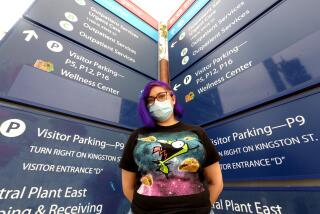Hospital Closures Could Hurt Emergency Care
- Share via
The closure of a North Hollywood hospital and possible shutdown of a second medical center nearby will lengthen ambulance rides by at least three to five minutes for some patients and increase pressure on emergency rooms at other hospitals in the Valley, county emergency officials said Friday.
The prediction comes a day after North Hollywood Medical Center announced it would shut its doors in August, closing an emergency room that currently handles about 450 ambulance patients every month. KaiFoundation Hospital in Panorama City, which handles about 200 ambulance patients a month, also is considering closing its emergency room and everything other than outpatient care services.
But the loss of the North Hollywood hospital is not expected to cause a health care crisis, because surrounding Valley hospitals can readily handle an increased load of emergency patients, said Virginia Price-Hastings, director of the Los Angeles County Emergency Medical Services Agency.
“There is no sense of panic right now,” Price-Hastings said.
However, this might change if Kaiser also shuts down, a “double whammy that could cause a little bigger problem,” she said. Because Kaiser just initiated discussions with federal officials about closing the 325-bed facility, county emergency officials have yet to assess the possible impact.
At the very least, some ambulances currently transporting emergency patients from North Hollywood will be diverted to other emergency rooms up to five miles away, an extra three to five minute drive on some calls, said Capt. David Thompson, the emergency medical service coordinator for the city Fire Department.
Most patients will be taken to Providence St. Joseph Medical Center in Burbank, the Sherman Oaks Hospital and Health Center on Van Nuys Boulevard, or Valley Presbyterian Hospital in Van Nuys, he said.
“When any hospital closes, it’s not good,” Thompson said. “But because of the location of surrounding hospitals, we don’t view this as a major problem.”
The Fire Department also has increased the number of paramedic units in the eastern San Fernando Valley, allowing quicker response times to emergencies, and providing more immediate care, Thompson said.
Still, if two Valley hospitals close, emergency rooms at the surrounding medical centers may reach capacity much faster during peak hours, forcing some ambulances to be diverted to other hospitals even farther away, Thompson said.
This would lengthen transport time and keep paramedics from their primary service areas for greater periods. Paramedics from outlying regions would be called in to provide assistance and answer emergencies, but their response time would be longer, he said.
“We may have to relocate paramedics if it becomes a problem,” Thompson said.
Tenet HealthSystem, the for-profit owner of North Hollywood Medical Center, Thursday announced it would close the facility Aug. 31 because its financial base had been “eroded” by reduced fees for medical care and a drop-off in referrals from doctors.
Kaiser, faced with a massive repair bill from the 1994 Northridge earthquake and new, stringent state requirements for seismic retrofitting, has opened talks with federal officials about closing its facility. Rep. Howard Berman (D-Mission Hills), whose district includes the Panorama City hospital, is working to stop the closure.
The Los Angeles County Emergency Medical Services Commission recently approved regulations requiring hospitals to give 90 days’ notice if they plan to close or shut down their emergency rooms, and to direct county health officials to assess the impact of losing the health care service. The policy takes effect Wednesday.
The regulation does not prevent a hospital from closing.
State lawmakers are considering similar legislation to cover all hospitals in California.
“More and more hospitals are closing, and it’s really impacting communities,” said Assemblyman Martin Gallegos (D-Baldwin Park), chairman of the Assembly Committee on Health who is sponsoring the bill. “This is the first step we need to take.”
More to Read
Sign up for Essential California
The most important California stories and recommendations in your inbox every morning.
You may occasionally receive promotional content from the Los Angeles Times.














